Pictures of Different Kinds of Cows
Breeds of cattle & buffalo
- Cattle Breeds
- Indigenous dairy breeds of cattle
- Indigenous Draught breeds of cattle
- Indigenous Dual purpose breeds of Cattle
- Exotic dairy breeds of cattle
- Buffalo breeds
- Indigenous buffalo breeds
- Related resources
- Cattle Breeding Farms
- Central Cattle Breeding Farms
- State Cattle Breeding Farms
- Contact details of State Livestock Development Boards / Animal Husbandry Departments (13.3KB)
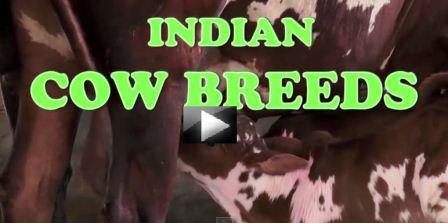
×
This Video Explains About Indian Cow Breeds
Cattle Breeds
Indigenous dairy breeds of cattle
1. Gir
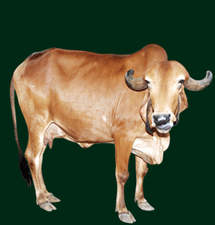
- This breed is otherwise known as Desan, Gujarati, Kathiawari, Sorthi, and Surati.
- Originated in Gir forests of South Kathiawar in Gujarat.
- Basic colours of skin are white with dark red or chocolate-brown patches or sometimes black or purely red.
- Horns are peculiarly curved, giving a 'half moon' appearance.
- Milk yield ranges from 1200-1800 kgs.
- Age at first calving 45-54 months and inter calving period from 515 to 600 days.
2. Red Sindhi
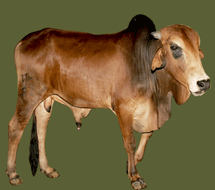
- This breed is otherwise called as Red Karachi and Sindhi.
- This breed mostly found in Karachi and Hyderabad district of Pakistan.
- Colour is red with shades varying from dark red to light, strips of white.
- Milk yield ranges from 1100-2600 kgs.
- Widely used in crossbreeding programmes.
- Age at first calving 39-50 months and inter calving period from 425-540 days.
3. Sahiwal
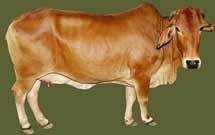
- Originated in Montgomery district in present Pakistan.
- This breed otherwise known as Lola (loose skin), Lambi Bar, Montgomery, Multani, Teli.
- The colour is reddish dun or pale red, sometimes flashed with white patches.
- The average milk yield of this breed is between 2,725 and 3,175 kgs in lactation period of 300 days
4. Deoni
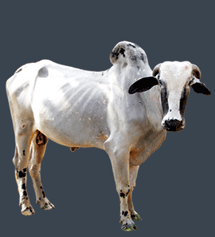
- This breed otherwise known as Dongerpati, Dongari, Wannera, Waghyd, Balankya, Shevera.
- Originated in Marathwada region of Maharashtra state and adjoining part of Karnataka and western Andhra Pradesh states.
- Body colour is usually spotted black and white.
- Age at first calving ranges from 894 to 1540 days with an average of 1391 days.
- Milk yield ranges from 636 to 1230 kgs with an average of 940 days.
- Caving interval averages 447 days.
Indigenous Draught breeds of cattle
1. Hallikar
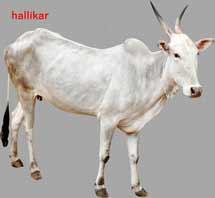
- Originated from the former princely state of Vijayanagarm, presently part of Karnataka.
- The colour is grey.
- They are compact, muscular and medium size animal.
- The breed is best known for its draught capacity and especially for its trotting ability.
2. Amritmahal
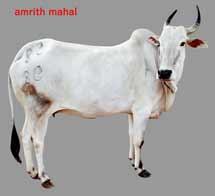
- Originated in Hassan, Chikmagalur and Chitradurga district of Karnataka.
- Amiritmahals are grey cattle but their shade varies from almost white to near black.
- Horns are long and end in sharp black points.
3. Khillari
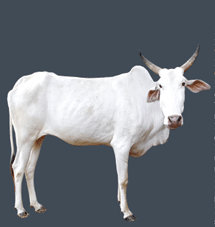
- Originated from Sholapur and Sitapur districts of Maharashtra.
- Grey-white in colour and have quick gait
4. Kangayam
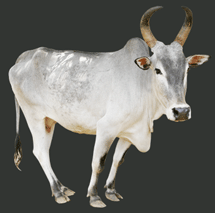
- Originated in Kangayam, Dharapuram, Perundurai, Erode, Bhavani and part of Gobichettipalayam taluk of Erode and Coimbatore district.
- The Kangayam breed was developed by the efforts of the late Pattogar of Palayakottai, Sri N. Nallathambi Sarkari Manradiar.
- Coat is red at birth, but changes to grey at about 6 months of age.
- Bulls are grey with dark colour in hump, fore and hind quarters.
- Bullocks are grey.
- Cows are grey or white. However, animals with red, black, fawn and broken colours are also observed.
- The eyes are dark and prominent with black rings around them.
5. Bargur
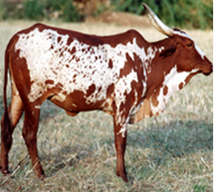
- Found around Bargur hills in Bhavani taluk of Erode district.
- Bargur cattle are of brown colour with white markings. Some white or dark brown animal are also seen.
- Animals are well built, compact and medium in size.
6. Umblachery
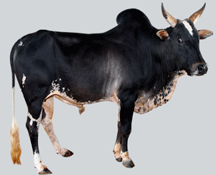
- It is otherwise called as Jathi madu, Mottai madu, Molai madu, Therkathi madu.
- Originated in Thanjavur, Thiruvarur and Nagappattinam districts of Tamil Nadu.
- Umblachery calves are generally red or brown at birth with all the characteristic white marking on the face, on limbs and tail.
- The practice of dehorning of bullocks is peculiar in Umblachery cattle.
7. Pullikulam / Alambadi
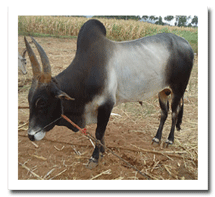
- This breed is commonly seen in Salem and Coimbatore district of Tamil Nadu and part of Bangalore district of Karnataka.
- Pulikulam / Alambadi bulls are dark grey, almost black and cows grey or white.
- They have the typical backward curving horns of Mysore type cattle.
- They are active, useful draught animals but not fast trotter.
Indigenous Dual purpose breeds of Cattle
1. Tharparkar
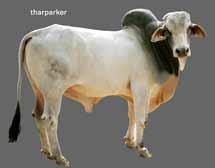
- Originated in Tharparkar district of southeast Sind in Pakistan.
- Otherwise known as White Sindhi, Gray Sindhi and Thari.
- Body colour is white or light grey.
- The bullocks are quite suitable for ploughing and casting and the cows are good milch animals (1,800 – 2600 kgs).
- Age at first calving ranges from 38-42 months and inter calving period from 430 to 460 days.
2. Hariana
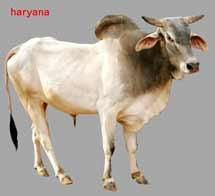
- It was originated from Rohtak, Hisar, Jind and Gurgaon districts of Haryana.
- Horns are small.
- The bullocks are good workers.
- Hariana cows are good milkers yielding on an average 1.5 kg/cow/day in a lactation period of 300 days.
- Average milk yield is 600 to 800 kgs per lactation. The age at first calving is 40-60 months.
4. Kankrej
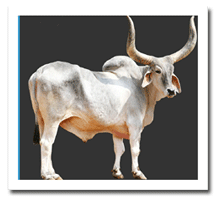
- It is otherwise called as Wadad or Waged, Wadhiar.
- Originated from Southeast Rann of Kutch of Gujarat and adjoining Rajasthan (Barmer and Jodhpur district).
- Colour of the animal varies from silver-grey to iron-grey or steel black.
- The gait of Kankrej is peculiar called as 1 ¼ paces (sawai chal).
- Kankrej is valued for fast, powerful, draught cattle. Useful in ploughing and carting.
- The cows are good milkers, yielding about 1360 kgs.
5. Ongole
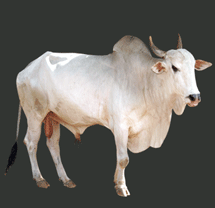
- Otherwise known as Nellore.
- Home tract is Ongole taluk in Gantur district of Andhra Pradesh.
- Average milk yield is 1000 kgs. Age at first calving is 38-45 months with an intercalving period of 470 days.
6. Krishna Valley
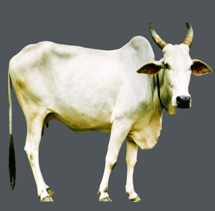
- Originated from black cotton soil of the water shed of the river Krishna in Karnataka.
- Animals are large, having a massive frame with deep, loosely built short body.
- Tail almost reaches the ground.
- Common colour grey white with a darker shade on fore quarters and hind quarters in male. Adult females are more whitish in appearance.
- The bullocks of this breed are powerful animals useful for slow ploughing, and valued for their good working qualities.
- The cows are fair milkers, average yield being about 916 kgs during the lactation period.
Exotic dairy breeds of cattle
1. Jersey
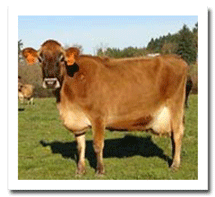
- It is the smallest of the dairy types of cattle developed on island of Jersey, U.K.
- In India this breed has acclimatized well and is widely used in cross breeding with indigenous cows.
- The typical colour of Jersey cattle is reddish fawn.
- Dished fore head and compact and angular body.
- These are economical producers of milk with 5.3% fat and 15% SNF.
2. Holstein Friesian
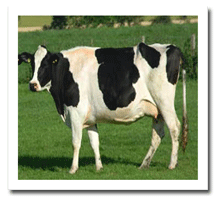
- This breed was developed in the northern parts of Netherlands, especially in the province of Friesland.
- They are ruggedly built and they possess large udder.
- They are the largest dairy breed and mature cows weigh as much as 700kg.
- They have typical marking of black and white that make them easily distinguishable.
- The average production of cow is 6000 to 7000 kgs per lactation. However, the fat content in their milk is rather low (3.45 per cent).
3. Brown Swiss
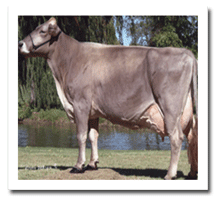
- The mountainous region of Switzerland is the place of origin of Brown Swiss breed.
- It is famous in its home tract for its rugged nature and good milk production.
- The Karan Swiss is the excellent crossbred cattle obtained by crossing this breed with recognized Indian breeds of cattle.
4. Red Dane
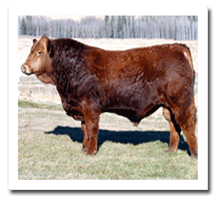
- The typical body colour of this Danish breed is red, reddish brown or even dark brown.
- It is also a heavy breed; mature males weighing up to 950 kgs and mature female weigh 600 kgs.
- The lactation yield of Red Dane cattle varies from 3000 to 4000 kgs with a fat content of 4 per cent and above.
5. Ayrshire
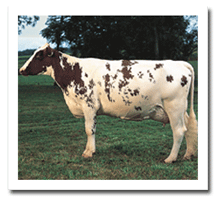
- Origin Ayrshire in Scotland is considered as most beautiful dairy breed. These are very active animals but hard to manage.
- They do not produce as much milk or butter fat (only 4%) as some of the other dairy breeds.
- The breed was also known as Dunlop cattle or Cunningham cattle.
6. Guernsey
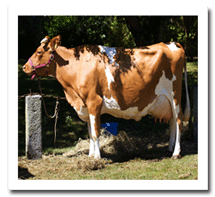
- Originated from Small island of Guernsey (France).
- The milk has a golden colour due to an exceptionally high content of beta carotene which may help to reduce the risks of certain cancers.
- The milk also has a high butterfat content of 5% and a high protein content of 3.7%.
- Guernsey cows produce around 6000 litres per cow per annum.
- The Guernsey cow has many notable advantages for the dairy farmer over other breeds includes high efficiency of milk production, low incidence of calving difficulty and longevity.
Buffalo breeds
Indigenous buffalo breeds
1. Murrah
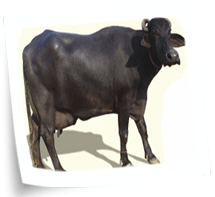
- It is the most important breed of buffaloes whose home is Rohtak, Hisar and Jind of Haryana, Nabha and Patiala districts of Punjab and southern parts of Delhi state.
- This is otherwise called as Delhi, Kundi and Kali.
- The colour is usually jet black with white markings on tail and face and extremities sometimes found.
- The tightly curved horn is an important character of this breed.
- The buffalo cows of this breed are one of the most efficient milk and butter fat producers in India.
- Butter fat content is 7%. Average lactation yield is varying from 1500-2500 kgs and the average milk yield is 6.8 kgs /day.
- It is also used for the grading up of inferior local buffaloes.
2. Surti
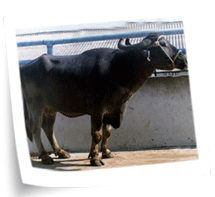
- The breeding tract of this breed is Kaira and Baroda district of Gujarat.
- Coat colour varies from rusty brown to silver-grey. Skin is black or brown.
- The horns are sickle shaped, moderately long and flat.
- The peculiarity of the breed is two white collars, one round the jaw and the other at the brisket.
- The milk yield ranges from 900 to 1300 kgs.
- The peculiarity of this breed is very high fat percentage in milk (8-12per cent).
3. Jaffrabadi
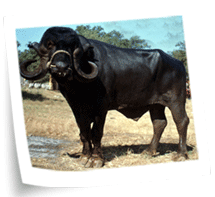
- The breeding tract of this breed is Gir forests, Kutch and Jamnagar districts of Gujarat.
- The horns are heavy, inclined to droop at each side of the neck and then turning up at point (drooping horns).
- The average milk yield is 100 to 1200 kgs.
- The bullocks are heavy and used for ploughing and carting.
- These animals are mostly maintained by traditional breeders called Maldharis, who are nomads.
4. Bhadawari
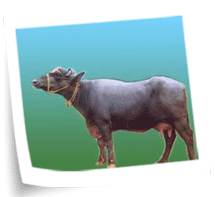
- Home tract of this breed is Agra and Etawah district of Uttar Pradesh and Gwalior district of Madhya Pradesh.
- The body is usually light or copper coloured is a peculiarity of this breed. Eye lids are generally copper or light brown colour.
- Two white lines 'Chevron' are present at the lower side of the neck similar to that of Surti buffaloes.
- The average milk yield is 800 to 1000 kgs.
- The bullocks are good draught animal with high heat tolerance.
- The fat content varies from 6 to 12.5 per cent. This breed is an efficient converter of coarse feed into butterfat and is known for its high butter fat content.
5. Nili Ravi
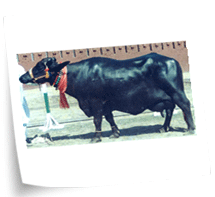
- This breed is found in Sutlej valley in Ferozpur district of Punjab and in the Sahiwal district of Pakistan. (Bred around Ravi river).
- The peculiarity of the breed is the wall eyes.
- The milk yield is 1500-1850 kgs per lactation.
- The intercalving period is 500-550 days and age at first calving is 45-50 months.
6. Mehsana
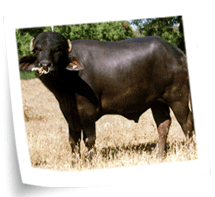
- Mehsana is a dairy breed of buffalo found in Mehsana town in Gujarat and adjoining Maharashtra state.
- The breed is supposed to have been evolved out of crossbreeding between the Surti and the Murrah.
- The milk yield is 1200-1500 kgs. The breed is supposed to have good persistency.
- The intercalving period ranges between 450-550 days.
7. Nagpuri
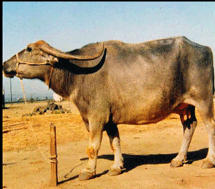
- The breeding tract of this breed is Nagpur, Akola and Amrawati districts of Maharashtra.
- These are black coloured animal with white patches on face, legs and tail. This is also called as Elitchpuri or Barari.
- The horns are long, flat and curved, bending backward on each side of the back. (Sward shaped horns).
- The age at first calving is 45-50 months with an intercalving period of 450-550 days.
8. Toda
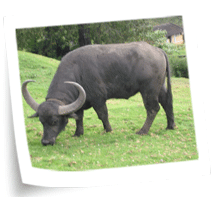
- Toda breed of buffaloes is named after an ancient tribe, Toda of Nilgiris of south India.
- The predominate coat colours are fawn and ash-grey.
- These buffaloes are quite distinct from other breeds and are indigenous to Nilgiris hills.
- Thick hair coat is found all over the body.
- They are gregarious in nature.
Source: Expert System for Cattle & Buffalo, TANUVAS & Vishwa Mangala Gou Grama Yathra
Related resources
Cattle Breeding Farms
Central Cattle Breeding Farms
| Central Cattle Breeding Farm, | Central Cattle Breeding Farm, |
| Central Cattle Breeding Farm, | Central Cattle Breeding Farm, |
| Central Cattle Breeding Farm, | Central Cattle Breeding Farm, |
| Central Cattle Breeding Farm, |
State Cattle Breeding Farms
Himachal pradesh
- Cattle Breeding Farms, Department of Animal Husbandry, Himachal Pradesh
| Cattle Breeding farm, | Cattle Breeding farm, |
| Cattle Breeding farm, | Cattle Breeding farm, |
| Cattle Breeding farm, |
- Sheep Breeding Farms, Department of Animal Husbandry, Himachal Pradesh
| Cattle Breeding farm, | Cattle Breeding farm, |
| Cattle Breeding farm, | Cattle Breeding farm, |
| Cattle Breeding farm, |
- Rabbit Farms, Department of Animal Husbandry, Himachal Pradesh
| Rabbit Breeding Farm, | Rabbit Breeding Farm, |
Kerala
| Cattle Breeding Farm, | Livestock Research Station |
| Centre for Pig Breeding & Research |
Karnataka
| tate Livestock Breeding & Training Center, | Livestock Breeding Farm, |
| Hallikar Cattle Breeding Center, | Livestock Research and Information Centre, |
Contact details of State Livestock Development Boards / Animal Husbandry Departments (13.3KB)
Pictures of Different Kinds of Cows
Source: https://vikaspedia.in/agriculture/livestock/cattle-buffalo/breeds-of-cattle-buffalo
0 Response to "Pictures of Different Kinds of Cows"
Post a Comment